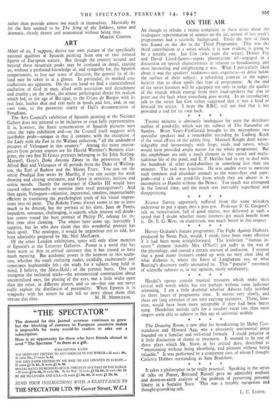ON THE AIR
As though to rebuke a recent complaint in these notes about the inadequate representation of science on the air, several of last week's programmes had a scientific background. Easily the best of them was Sound on the Air in the Third Programme. This was the third contribution to a series which, it is now evident, is going io be a notable one. Ian Cox (who runs the series), Dennis Fry and David Lloyd-James--expert phoneticians all—engaged in a discussion on speech characteristics in relation to broadcasting, and most interesting and enlightening it was. What I particularly liked about it was the speakers' readiness—nay, eagerness—to delve below the surface of their subject: a refreshing contrast to the super- ficiality that so often spoils this type of programme. At the and of the series listeners will be equipped not only to judge the quality of the sounds which emerge from their loud-speakers but also to point out the fault when something goes wrong. In an introductory talk to the series Ian Cox rather suggested that it was a kind of first-aid for critics. I hope the B.B.C. will not find that it has provided a rod for its own back.
Twenty minutes is obviously inadequate for even the sketchiest outline of pond-life, which was the subject of The Naturalist on Sunday. Brian Vesey-FitzGerald brought to the microphone two specialist speakers and a remarkable recording by Ludwig Koch of the vocal efforts of the edible frog. Maxwell Knight dealt know- ledgeably and interestingly with frogs, toads and newts, which would have provided ample matter for the whole programme. But the amphibians are only a small element in the varied and multi- tudinous life of the pond, and E. P. Herlihy had to try to deal with the hundreds of other pond-dwellers in something less than ten minutes. The task was hopeless. He was unable even to mention such common and abundant animals as the water-fleas and cope- pods—and a talk on pond-life from which they are absent is as incomplete as Hamlet without the Prince. Too much was attempted in the limited time, and the result was inevitably superficial and disappointing.
Science Survey apparently suffered from the same mistaken endeavour to put a quart into a pint pot. Professor F. G. Gregory's talk on vernalisation, full of good matter, was delivered at such a speed that I doubt whether many listeners got much benefit from it. Dr. E. G. West, on aluminium, was much better in this respect Harvey Graham's feature programme, The Fight Against Diabetes, produced by Nesta Pain, would, I think, have been more effective if it had been more straightforward. The irrelevant "human in- terest" element (notably Mrs. O'Neill) got sadly in the way of the physiology, and caused a certain amount of confusion. I suspect that a good many listeners ended up with no very clear idea of what diabetes is, where the Islets of Langherans are, or what Banting's discovery really amounted to. This "popular" treatment of scientific subjects is, in my opinion, rarely satisfactory.
Handel's operas contain musical treasures which make their revival well worth while, but not perhaps without some judicious trimming. I am a little doubtful whether Admeto fully justified its three hours of programme time. It moves very slowly, and there are long stretches of not very exciting recitative. These, how- ever,. would have been more acceptable if they had been better sung. Handelian melody calls for a steadier vocal line than most singers seem able to achieve in this age of universal wobble.
* * The Drawing Room, a new play for broadcasting by Mabel Con- standuros and Howard Agg, was a pleasantly sentimental piece founded on a familiar and well-tried formula. I could perceive in it little distinction of theme or treatment. It seemed to be one of those plays which Mr. Shaw, in his critical days, described as "entertaining without being absorbing, and pleasant without being valuable." It was performed by a competent cast, of whom I thought Carleton Hobbes outstanding as Sam Bradshaw.
* * It takes a philosopher to be really practical. Speaking in the series of talks on Power, Bertrand Russell gave an admirably realistic and down-to-earth analysis of the problem of preserving personal Liberty in a Socialist State. This was a notably outspoken and thought-provoking talk.
L. C. LLOYD.


































 Previous page
Previous page